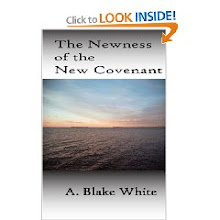
DEDUCTIONS OF NCT
Allow me to close this series of posts on the three systems of theology (Dispensationalism, Covenant Theology, New Covenant Theology) by making some deductions regarding NCT. I made certain deductions with both DT and CT, so it is only fair that I do the same with NCT.
First, NCT takes "more seriously" what Scripture says, and is less driven by human logic. It takes its lead from what the Spirit reveals in His Word- reads the text at face value. This does not mean that NCT detests logic, or ignores it! Rather, it seeks to be driven more by what the text says than by what a previous church confession might say. This is primarily seen in the manner in which NCT argues very reasonably for Scripture's constant emphasis on the contrast between the Old and New Covenants (Hebrews 8:6-13). They point to the many features that make up the Old Covenant. The Old Covenant was a works, conditional, and law based covenant. Furthermore, the Spirit of God functioned quite differently in the Old Covenant compared to His function in the New Covenant. In addition, the Old Covenant under God was composed of a mixed bag of true believers (the remnant) and unbelievers. God's people in the Old Testament found their identity in a nation state driven by ethnicity whose ultimate purpose was to "picture" the true people of God- the church of the New Covenant. One was considered to be in the Old Covenant by means of circumcision.
On the other hand, the New Covenant is entirely unconditional for the elect. It is not law based, but Spirit driven. Furthermore, the Spirit of God indwells every member of this covenant, which means that there is greater power to obey God as one is led by the Spirit. Thus, the New Covenant cannot be composed of both believers and unbelievers. It is composed of only believers. This does not mean that there exists no room for the common categories "invisible church" (true believers), and the "visible church" (professed believers- the church as we see it). However, in reality, there is only "one people", thus "one church" in God's eyes. But we cannot see people's hearts, only God can (Deuteronomy 29:29). Therefore, NCT affirms that only true believers are actually members of the New Covenant, while at the same time admitting that there exists both wheat and chaff in the current state of Christ's Kingdom. The chaff will be separated from the wheat, however, to be burned up. That is not our job, but Christ's, and it will take place in the future (Matthew 3:12). In addition to all of this, God's people in the New Covenant do not find their identity in a nation state, and it is not primarily composed of any ethnic group (Galatians 3:28). And finally, one becomes a member in the New Covenant through "circumcision of the heart" (regeneration/new birth by the Spirit), not physical circumcision (Colossians 2:11).
I say all of the above to affirm that NCT seeks to be faithful to the message of Scripture. It is not afraidto depart from "sacred" confessions. It, therefore, holds more firmly to the authority and inerrancy of Scripture than the other two systems. Now, I am not saying that the other two systems deny the authority and inerrancy of Scripture. Again, the issue is one of precision and consistency. NCT is most precise and consistent.
Second, this view of the Mosaic (Old) Covenant does not mean that NCT purports that salvation was by "works" in the Old Covenant. NCT does not "break up" Scripture unecceasrily. It recognizes (very firmly) the unity of salvation in both Testaments. The Mosaic law does not "cancel out" the grace of God! NCT does a nice job of showing that the whole purpose of the Old Covenant was to show the exceeding sinfulness of sin to lead us to Christ (Galatians 3:19-29). Therefore, in that sense it was actually gracious. NCT emphasizes that God's covenant with Abraham, which came four hundred and thirty years before God's covenant with Israel on Mt. Sinai, is the basic pattern for salvation in both the Old and New Covenants (Galatians 3:16-17). In other words, salvation has been, and always will be by grace through faith. This is Paul's whole argument in Romans 4. Abraham believed God, and because of his belief (not obedience to God's law at the time), he was counted as righteous- right before God. In short, he was justified by faith. In Galatians 2:16, Paul says "a man is not justified by the works of the law but through faith". The clear implication here is that even faith itself is a gift from God; it is not considered a work. That's what Paul means. He uses the word "but" to show the complete contrast of "works" from "faith". They are not the same. Even the demonstration of faith is a gift from God (Ephesians 2:8-9).
The Psalmist expresses salvation by grace when he says, "If You, LORD, should mark iniquities, O Lord, who could stand? But there is forgiveness with You, That You may be feared" (Psalm 130:3-4). And Paul quotes David from Psalm 32:2 in Romans, "just as David also speaks of the blessing on the man to whom God credits righteousness apart from works: "BLESSED ARE THOSE WHOSE LAWLESS DEEDS HAVE BEEN FORGIVEN, AND WHOSE SINS HAVE BEEN COVERED. "BLESSED IS THE MAN WHOSE SIN THE LORD WILL NOT TAKE INTO ACCOUNT" (Romans 4:6-8).
Thus, I conclude that NCT faithfully supports the Gospel without compromising with logic. In other words, it is honest about the function of the Old Covenant, yet does not go to the extreme of denying that salvation has always been by grace through faith. In this area it does better than classic dispensationalism (which is really dead).
Third, NCT has a more logical and reasonable understanding regarding the identity of ethnic Israel and the church. To understand (as the dispensationalist does) that God has primarily made promises to an ethnic nation as His ultimate goal seems to go against everything the New Testament Scriptures teach (Acts 2; Ephesians 2:11-22; Galatians 3:28, etc.). There is no distinction between Jew and Gentile, Paul says, but both groups have become one new man! Furthermore, to understand (as the covenant theologian does) that those in the New Covenant join together with the church of the Old Covenant does not seem to be precisely accurate either. For does this not ignore Peter's great sermon in Acts 2:14 ff? Peter argues that the prophesy which Joel made was fulfilled that very day. That day marked the establishment of a new people- a new entity indwelt by the Spirit. As pointed out above, this new people look nothing like the nation of Israel in most respects. Although, it is still true that national Israel pictured them in a qualified sense.
NCT does better than CT in this area. NCT argues that it is uneccesary to place the church and Israel so close together that there is no difference whatsover. It rightly sees that there is one, true people of God for all time, while at the same time affirming the distinct funciton of national Israel in the Old Testament era. Quite frankly, it is the only system that makes sense on this point. It relieves all confusion- confusion that both DT and CT bring into the equation.
I could go on, but as I stated before it is sometimes better to be concise. I fear that I might weary you. And I do not want to do that. I have tried to be as honest and straightforward as possible regarding the differing views of these three theological systems. It does matter what one believes. All three systems have practical implications for the church- God's people. It does matter that we are precise. As Mike said Sunday, "little things do matter". A little leaven can leaven the whole lump! We must get Scripture right. We must understand it. And we must apply it- all for the glory of God. I have not arrived to a perfect mind yet. The day that I profess to have all the answers is the day that you should never listen to my sermons, or read this blog again. No matter how old we get, we must understand that we can grow each time we read Scripture. The "doctrines" which we think ourselves to understand entirely show up in different places throughout Scripture. And if we are faithfully studying Scripture, we will repent when we see a new facet of that same old doctrine that we thought we understood perfectly. It is my prayer that we would never study Scripture (and studying these three systems is studying Scripture!) to appear intelligent and spiritual. It is my prayer for all of us that we study Scripture: 1) to be approved of God as a workmen who does not need to be ashamed because we have handled God's word rightly (2 Timothy 2:15), and 2) to grow in grace as the Spirit of the living God works in us for His glory. Church's are not to have "seminary environments" where everyone tries to impress others with the "knowledge" they possess. Rather, the church must be captivated with Christ, and seek to understand His word so they can fall more in love with Him. To borrow the theme from the youth retreat this year- it's all about Jesus: only, always, and forever! I would like to leave you with a verse from Isaiah that reminds us why God chose to save sinners like us:
"I, even I, am the One who wipes out your transgressions for My own sake" (Isaiah 43:25).
May we understand that we are saved for His sake and glory. Thus, we study Scripture for His sake and glory that we might know Him better. I hope these posts have been helpful. I take blame where I have misspoken, and I take no credit where I have spoken rightly.
Not Professing to be Wise,
Pastor Andy








Andy, Well said! I applaud your effort to summarize these things and appreciate your contributions and the contributions of Grace Chapel to NCT.
ReplyDelete